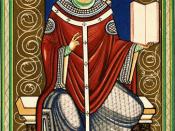"Explain the contribution and significance of St. Jerome, St. Augustine, St. Ambrose, St. Benedict, St. Boniface and St. Gregory to the foundation of medieval Christendom."
By translating and continuing the works of the Greek models St. Jerome laid solid foundations in Western Europe for the general culture of the middle Ages. In his translation of The Chronicle he has supplied the historical foundation of the Middle Ages with the material needed to summarise the past as an introduction to the writings of his contemporaries. The volume of translations he compiled were also of great significance, particularly the Vulgate, Greek philosophy and the Hebrew scriptures.
St. Ambrose was the first theological writer to express the principal of the separation of the spiritual and temporal powers, this proved to be of great importance for the reconstruction of civilization as it established the idea f the Christian Emperor dutiful to the Church.
In St. Ambrose we also see the first attempt to systematically present Christen ethics, virtues and manner.
St. Augustine is most significant in that he laid much of the foundation for Medieval Christian though, his adaptation of Roman and Platonic thought into Christian tradition resulted in a theological system of lasting influence. His City of God is based on ideal rules of conduct for mans action and may also be seen as a cultural program for humanity. These ideals were adopted by Pope Gregory I and became formalized in the Middle Ages.
St. Benedict is a key figure in the establishment of monasticism in the middle Ages. His primary work The Rule is significant in that I was won over by the Carolingian Kings and became the foundation of Monastic Rule in Western Christendom. The Rules purpose was not to institute an order of clerics with clerical duties and...


